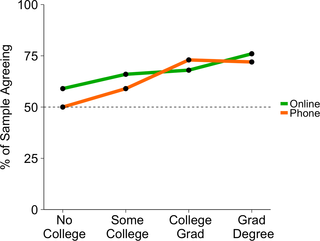I have heard about this before. I fail to see the problem, I can easily believe that it’s good for the human psyche to think that it’s fairly capable, even if it’s not completely true. It’s needed for basic functioning I think
Most idiots think this
How would you rank youself in terms of intelligence?
I’m not a complete idiot, I think
Sad to say, seeing what happens in the world is clear what most differentiates us from animals, is our stupidity and that we do not stumble twice with the same stone, but 50 times.
This could mathematically be possible if intelligence was not spread on a perfect normal distribution, by construction.
If a dataset is [10, 10, 10, 10, 1], then 80% are above average, or more specifically, above the mean.
That being said, saying that you think you’re of above average intelligence is a thoroughly cringey and narsisistic thing to do.
Yeah, and even if it’s perfect distribution, the result isn’t that bad. Sure, there’d be the possibility of having lots of people who consider themselves less inteligent but are moreso than the average and vice-versa. But all in all, there’d only 15% more people who would consider themselves smarter than average and be wrong about it.
If only 1 in 7 of my friends wrongly believes they’re smarter than average, I’d say that’s acceptable.
all in all, there’d only 15% more people who would consider themselves smarter than average and be wrong about it
If by “perfect distribution” you mean “normal distribution”, and/or if we assume that “average” means “median” instead of “mean”, then from the survey result “65% of Americans believe they are smarter than average” we can actually conclude that a minimum of 15% of respondents incorrectly asses themselves to be smarter than average - but it could only be as low as 15% if 100% of the people assessing themselves to be less intelligent than average are correct.
If 1% of the people incorrectly asses themselves to be less intelligent than average, then 16% are incorrectly assessing themselves to be more intelligent than average, and so on.
(Ignoring that embedded in this survey is the antiquated notion that the quantification of intelligence is even valid in the first place…)

Sorry for the late reply. It’s been sitting in my Lemmy notifications for a long time and I didn’t properly read it until now. Thanks for having take the time to explain how the total amount of people who incorrectly assess themselves regarding the mean/median can be broken down.
Also, the discussion regarding the validity of intelligence was interesting. After reading the Wikipedia entry, it’s clear to me that it’s a limited metric, if not a wholly invalid metric.
I have to wonder about the methodology of such a study. Unintelligent people tend to gravitate towards “lifestyles” that might mean they’re in no position to be taking surveys. How many death row inmates were in this survey? How many just in prison? The link talks about phone and online surveys… how many morons have neither? There is reason to suspect that they just happened to talk to more people who were slightly above average than those who were slightly below.
For that matter, I happen to remember a grade card of some sort from an IOWA test back in the 1980s, where I was in the 99th percentile (I specifically remember that word, though at the time I wouldn’t have understood its significance). If I were to have taken this survey, how would it be accurate to construe my answers as a “belief”?
Really, for the headline to mean anything at all, you’d somehow have to filter out everyone who didn’t know for a fact that they were above average (and if you fail to do so, you’re deliberately trying to create clickbait).









